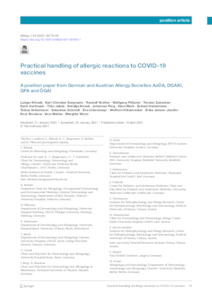Klimek, Ludger and Bergmann, Karl-Christian and Brehler, Randolf and Pfützner, Wolfgang and Zuberbier, Torsten and Hartmann, Karin and Jakob, Thilo and Novak, Natalija and Ring, Johannes and Merk, Hans and Hamelmann, Eckard and Ankermann, Tobias and Schmidt, Sebastian and Untersmayr, Eva and Hötzenecker, Wolfram and Jensen-Jarolim, Erika and Brockow, Knut and Mahler, Vera and Worm, Margitta.
(2021)
Practical handling of allergic reactions to COVID-19 vaccines: A position paper from German and Austrian Allergy Societies AeDA, DGAKI, GPA and ÖGAI.
Allergo Journal International, 30 (3).
pp. 79-95.
![[img]](https://edoc.unibas.ch/style/images/fileicons/application_pdf.png)  Preview |
|
PDF
- Published Version
Available under License CC BY (Attribution).
712Kb |
Official URL: https://edoc.unibas.ch/82958/
Downloads: Statistics Overview
Abstract
For the preventive treatment of the 2019 coronavirus disease (COVID-19) an unprecedented global research effort studied the safety and efficacy of new vaccine platforms that have not been previously used in humans. Less than one year after the discovery of the severe acute respiratory syndrome coronavirus 2 (SARS-CoV-2) viral sequence, these vaccines were approved for use in the European Union (EU) as well as in numerous other countries and mass vaccination efforts began. The so far in the EU approved mRNA vaccines BNT162b2 and mRNA-1273 are based on similar lipid-based nanoparticle carrier technologies; however, the lipid components differ. Severe allergic reactions and anaphylaxis after COVID-19 vaccination are very rare adverse events but have drawn attention due to potentially lethal outcomes and have triggered a high degree of uncertainty.; Current knowledge on anaphylactic reactions to vaccines and specifically the new mRNA COVID-19 vaccines was compiled using a literature search in Medline, PubMed, as well as the national and international study and guideline registries, the Cochrane Library, and the Internet, with special reference to official websites of the World Health Organization (WHO), US Centers for Disease Control and Prevention (CDC), Robert Koch Institute (RKI), and Paul Ehrlich Institute (PEI).; Based on the international literature and previous experience, recommendations for prophylaxis, diagnosis and therapy of these allergic reactions are given by a panel of experts.; Allergy testing is not necessary for the vast majority of allergic patients prior to COVID-19 vaccination with currently licensed vaccines. In case of allergic/anaphylactic reactions after vaccination, allergy workup is recommended, as it is for a small potential risk population prior to the first vaccination. Evaluation and approval of diagnostic tests should be done for this purpose.
| Faculties and Departments: | 03 Faculty of Medicine > Bereich Spezialfächer (Klinik) > Dermatologie USB > Allergologie (Hartmann)
03 Faculty of Medicine > Departement Klinische Forschung > Bereich Spezialfächer (Klinik) > Dermatologie USB > Allergologie (Hartmann)
03 Faculty of Medicine > Departement Biomedizin > Department of Biomedicine, University Hospital Basel > Allergy and Immunity (Hartmann) |
|---|
| UniBasel Contributors: | Hartmann, Karin |
|---|
| Item Type: | Article, refereed |
|---|
| Article Subtype: | Research Article |
|---|
| Publisher: | Springer |
|---|
| e-ISSN: | 2197-0378 |
|---|
| Note: | Publication type according to Uni Basel Research Database: Journal article |
|---|
| Language: | English |
|---|
| Identification Number: | |
|---|
| edoc DOI: | |
|---|
| Last Modified: | 18 Nov 2022 15:46 |
|---|
| Deposited On: | 18 Nov 2022 15:46 |
|---|
Repository Staff Only: item control page
